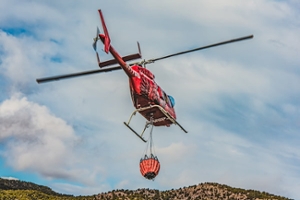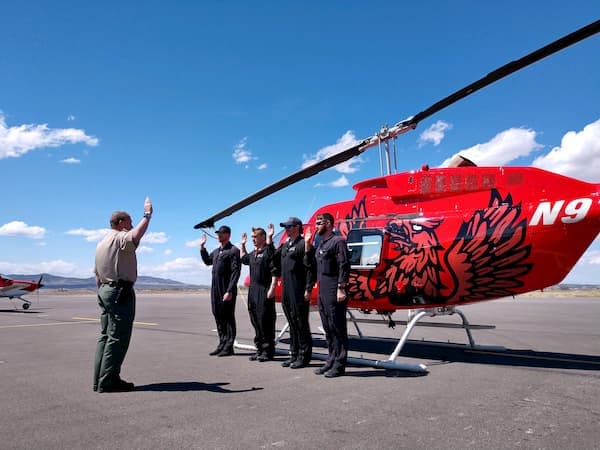Is It Worth Becoming a Helicopter Pilot?
Posted: June 08, 2020 | Author: Jaidyn Crookston | Read Time: 10 minutes
 If you’re exploring the idea of becoming a helicopter pilot, then you’re probably wondering whether or not it would be worth it. This is a common question for potential pilots and one that is very important when thinking of a future career. Because you’ll spend the rest of your life in a career, it’s important to make sure you’re doing something you enjoy. Is becoming a helicopter pilot worth it?
If you’re exploring the idea of becoming a helicopter pilot, then you’re probably wondering whether or not it would be worth it. This is a common question for potential pilots and one that is very important when thinking of a future career. Because you’ll spend the rest of your life in a career, it’s important to make sure you’re doing something you enjoy. Is becoming a helicopter pilot worth it?
Simply put, if you love to fly and think the idea of spending hours a day in a cockpit thousands of feet above the beautiful views sounds like fun, then yes, becoming a helicopter pilot will be worth it. Now for the details.
As with any job, there are upsides and downsides to becoming a helicopter pilot, although in this case the ups far outweigh the downs.
Here are some of the difficult things about becoming a pilot that may make some people wonder if this career is worth it for them:
- Learning to fly is challenging
- Training is rigorous
- Low paying jobs while you build hours
Here are some of the things that make becoming a pilot totally worth it:
- Eventually, you’ll make really good money (over $90,000 a year according to salary.com)
- Flight school is an investment
- A chance to do good and help people
- High pilot demand
- Job variety
- FLYING
Now here is a little more information about each of these points to help you make your own decision.
Learning to fly is challenging:
It takes a lot of practice to successfully fly a helicopter on your own. If you expect to go to flight school and be a pro right away, you’ll soon be disappointed. Practice and dedication will play a large part in getting your pilot’s license.
Even though learning to fly is tough in the beginning, it will get easier as you get further into your training. Once you get past the initial challenge of keeping a helicopter steady, you’ll become more confident and will eventually be able to take on any challenge. By the time you graduate, you’ll have hundreds of flight hours and will be qualified and experienced enough to get a job as a pilot.
 Training is rigorous:
Training is rigorous:
Flight training is rigorous. The program you attend will determine just how rigorous your training is, but all programs come with challenges and obstacles to overcome. Flight training involves training both in the sky and on the ground. Many programs call these flight labs and ground labs, although every school may have different names for them. Basically, a flight lab is the time you spend in the air flying a helicopter while a ground lab is the time you spend on the ground learning aviation laws and flight techniques and studying for homework and exams.
If your goal is just to have your pilot’s license for fun and not work as a pilot, then you’ll only need your private pilot’s license and maybe your instrument license. You can get your private pilot’s license in as little as a few months, and this training won’t be as rigorous as it will if you are getting all your pilot’s licenses.
Becoming a fully licensed helicopter pilot means that you’ll have to get a couple of different licenses. In order to work as a pilot you’ll need your private, commercial, instrument, and preferably your CFI (Certified Flight Instructor) and CFII (Certified Flight Instructor Instrument) licenses. In addition to these required licenses, any extra training you get while in school (such as longline training, mountain operations training, and night vision goggle training) will boost your resume and help you land those coveted high paying jobs.
Most flight schools allow you to get all of these licenses in about two years, although some programs are shorter. While a shorter training time may sound like the best option, keep in mind that these shorter programs don’t have the time to give you the experience and advanced training that will help you get a job as a pilot. These shorter programs will get you your required licenses, but not much else.
Flight programs at a university flight school will give you a degree with your license, as well as extra experience, more flight hours, and advanced training. Even though these programs take longer, they will set you up for your future better than a short program will.
Low paying jobs while you build hours:
As a new pilot, you’ll most likely work a low paying job. This is because the high paying pilot jobs require a lot of flight hours, something you won’t have as a newly licensed pilot. Rather than viewing this as a downside of becoming a helicopter pilot, think of this first job as a way to build your flight hours and give you valuable experience, which is really no different than working in any other industry. Once you’ve ‘paid your dues’ and earned about 1,000 flight hours (which may take as little as a year or two), you’ll qualify for higher paying jobs and more benefits. As soon as you get past this stage, the rest of your career as a pilot will be bright and you’ll quickly start to pay back what you spent on your education.
The most common first job for a helicopter pilot is as a flight instructor. Most flight schools like to hire recent graduates to work as instructors, so chances of finding a job at your own flight school are high. If you attend a university flight school, you’ll get an associate’s degree with your pilot’s licenses. Now you’ll have the option of continuing your education and getting a bachelor’s degree.
If you choose to get a bachelor’s degree and are able to get a job as an instructor, you’ll be able to earn money while still in school. This is a great opportunity because you’ll still be eligible for financial aid and scholarships and won’t yet have to pay back your student loans, giving you a chance to save up money and get a head start on your payments.
Eventually you’ll make really good money:
Once you’ve gotten your first 1,000 flight hours, you’ll qualify for high paying pilot jobs. According to salary.com, the average salary of a helicopter pilot is $96,000 per year. High paying pilot jobs include flying for offshore oil rigs, business executives, celebrities, and private companies. While getting a high paying job as a pilot isn’t guaranteed, demand for pilots is high and there are plenty of high paying jobs out there.
Flight school is an investment:
Flight school is an investment. Yes, getting through flight school will take some money, but once you’re out in the industry making money as a pilot, you’ll quickly earn back what you spent on flight school. In fact, the Return on Education for a helicopter pilot is higher than that of a doctor, lawyer, or a dentist. For every $1 you spend on your education, you can expect to earn about $45 during your career.
A few flight schools are able to take full VA Benefits from veterans, meaning that by attending one of these flight schools you may not have to pay anything for your education other than books and supplies. If you’re a veteran and want to become a pilot, it’s important that you find a flight school that caters to veterans and is able to accept full VA benefits.
If you aren’t a veteran, there are still plenty of ways to fund your flight training. If you attend a university flight school you’ll have access to scholarships, federal financial aid, and student loans. Once you’re able to fund your flight training, all you’ll have to worry about is getting through training and earning your licenses.

A chance to do good and help people:
If you like helping people and want to make a difference in the world, then flying helicopters is a great career for you. Some jobs available to helicopter pilots that will help you do this include flying for emergency medical services, law enforcement, fire fighting, humanitarian support, search and rescue, and more.
Many people decide to become a pilot because of how rewarding this profession is. What’s better than being able to help people all day long and getting paid to fly while doing it?
High pilot demand:
Helicopter pilots are in high demand. There will be a shortage of 59,000 helicopter pilots by 2037, according to a study done by Boeing. One reason for this shortage is because the aviation industry is rapidly changing and expanding into new industries. Another reason for the shortage is that pilots who began flying when helicopters became a commercial enterprise are now retiring. Currently, more pilots are retiring than there are new pilots entering the workforce. This is why helicopter pilots are in high demand and will continue to be in high demand for years to come. Now is the perfect time to become a helicopter pilot, since you’re almost guaranteed to have a job for your whole career.
Job variety:
Helicopters are used in many different industries. And since pilots are needed to fly the helicopters, there are lots of different types of jobs to choose from.
If you enter an industry and decide it isn’t for you, it’s easy to switch to another one. Say you’re working as a pilot for an agricultural company and then decide you want to do something different. You can easily change career paths and work for another company or industry like tourism or transportation or anything else. It’s possible that your new job will require some extra training. For example, if you want to become a police pilot or a firefighter you may have to go through police training. This training won’t be very extensive and it won’t take long for you to become fully qualified for your new job, especially if you got advanced training during your original flight training (such as long line training for a firefighter).
Some of the industries that employ helicopter pilots are: medical, law enforcement, entertainment, agricultural, utility, transportation, corporate, and many more. When you decide to become a pilot, you’re opening up your career to so many possibilities!
FLYING:
As a helicopter pilot, your office will be thousands of feet above the ground and will have amazing views. You’ll spend every day doing exactly what you love the most: flying.
What could be better than that?
So is it worth it to become a helicopter pilot? If you love the idea of flying and if this lifestyle sounds awesome, then yes, becoming a pilot will definitely be worth it.
If the idea of becoming a pilot doesn’t make you smile and want to run to the nearest airport, then spending the time and money it takes to get your license may not be worth it to you.
The bottom line is that whether becoming a pilot will be worth it or not is entirely up to you and your situation. Everyone is different, with different desires, career goals, and motivation. If you do think that becoming a pilot will be worth it, then you should start on that path today.
Once you decide to become a pilot, then it’s important that you choose a good flight school. If you want a flight school that puts students first and supplies the aviation industry with 10% of incoming helicopter pilots (more than any other flight school), then SUU Aviation is the school for you.
If you have questions about whether becoming a pilot will be worth it for you, contact SUU Aviation. If you want to know more about the industry and the school, come in for a tour. You can meet the staff, talk to current students and instructors, and even sit in the aircraft. If becoming a pilot is your dream, let SUU Aviation help make it your reality.
This article was published more than 3 years ago and might contain outdated information or broken links. As a result, its accuracy cannot be guaranteed.
Tags: Aviation




